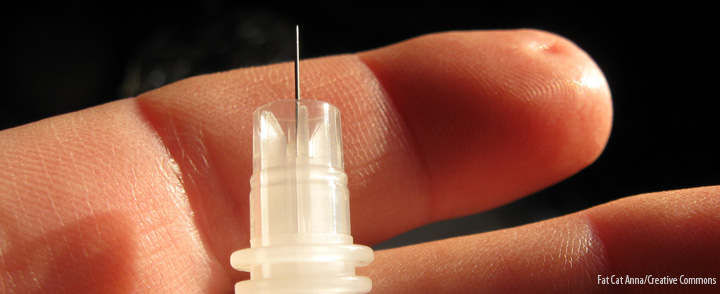Janis Siegel, JTNews Columnist
If you or someone you know has been diagnosed with Type 1 diabetes within the last four years, there’s more good news from Ben-Gurion University of the Negev researcher Dr. Eli Lewis.
The most recent results from Phase 1 of Lewis’s second round of clinical trials showed very positive outcomes similar to the first round of testing — that most of the patient “responders” in his study treated with the anti-inflammatory drug alpha 1-antitrypsin were able to either become insulin-free or dramatically reduce their insulin use.

“The responders showed one major positive end-point,” Lewis, the director of BGU’s Department of Clinical Biochemistry and Pharmacology told JTNews. “They made more insulin of their own compared to the initial entry levels they had. Considering the disease is typically a down-hill slope upon diagnosis, this is a very encouraging positive parameter.”
Always cautioning against the temptation to call it a “cure,” Lewis now sounds more like an eager warrior with the enemy in his sights.
“Our reaction is very positive on several levels,” said Lewis. “First, safety and compliance are exceptionally good, which is not so trivial when it comes to combating one of the world’s greatest incurable epidemics.”
Both the younger and older early onset diabetics in the study either stopped or reduced their use of insulin for over two years now with no negative side effects. The Jewish Sound profiled Israel’s consul general to the Pacific Northwest, whose family has responded very positively to these treatments, on Oct. 25, 2013.
“Second, the proportion of responders is a great start,” he said. “We really didn’t know what to expect. Based on these findings we now have the second round of trials much more tailored and adjusted for better benefit.”
The study was performed in collaboration with a research team from the Barbara Davis Center for Childhood Diabetes at the University of Colorado and published in The Journal of Clinical Endocrinology and Metabolism.
Once again, Lewis’s method of dosing diabetic patients with AAT after a transplant of healthy pancreatic clusters of cells called islets reduced inflammation in the islets, one of the main instigators and perpetuators of the disease.
“We know inflammation plays an extremely important role in the disease,” said Lewis. “When we receive patients, the inflammatory flare is already in the islets; however, no one knows for sure where it started prior to diagnosis.”
Results showed that treating Type 1 diabetic patients with AAT, this time weekly for eight weeks, while injecting healthy pancreatic islets into the patient could be a potential cure.
“Inflammation, according to our findings, is the pivotal obstacle in optimal islet transplantation,” Lewis said.
The 12 study subjects were given an infusion of 80 milligrams of AAT, a drug already FDA approved and used for decades to slow the progression of lung disease and decrease inflammation from smoking, asthma, and respiratory infections.
AAT is derived from a natural human blood protein. According to Lewis, this compatibility is a factor in the study’s positive results.
“Safety first,” said Lewis. “Any drug that’s based on a naturally occurring human protein has an edge over synthetic artificial entities…. Secondly, we do see AAT as being a failing part in the course of diabetes, so we consider this approach an augmentation of AAT in patients that have non-functional AAT.”
However, wrote researchers in the study report, the study design did not include a placebo group and it also used a small sample size of 12 patients.
Lewis said the next three clinical trials will include at-risk and recently diagnosed subjects and he will concentrate on finding the optimal AAT dosage amounts needed to achieve the most insulin reduction in the study subjects.
Lewis and his team will recruit more than 25 patients at each of the three centers where they will be treating patients, for a total sample size of at least 75 subjects.
These next trials will also include the use of a placebo group.
“The ethical issue is to allow standard treatment which is insulin, which is included for all,” said Lewis. “It’s then all about whether the individuals start reducing units.”
Another significant benefit of the AAT treatment was the absence of any negative side effects after administering the drug.
Patients were monitored for adverse effects and none were reported.
“Based on these findings we now have the second round of trials much more tailored and adjusted for better benefit,” Lewis said.
If AAT is proven to be effective in eliminating and lowering the need for insulin in Type 1 diabetic patients, Lewis said it would most likely be two years before AAT could be approved for on-label use by the FDA.
Longtime JTNews correspondent and freelance journalist Janis Siegel has covered international health research for SELF magazine and campaigns for Fred Hutchinson Cancer Research Center.
